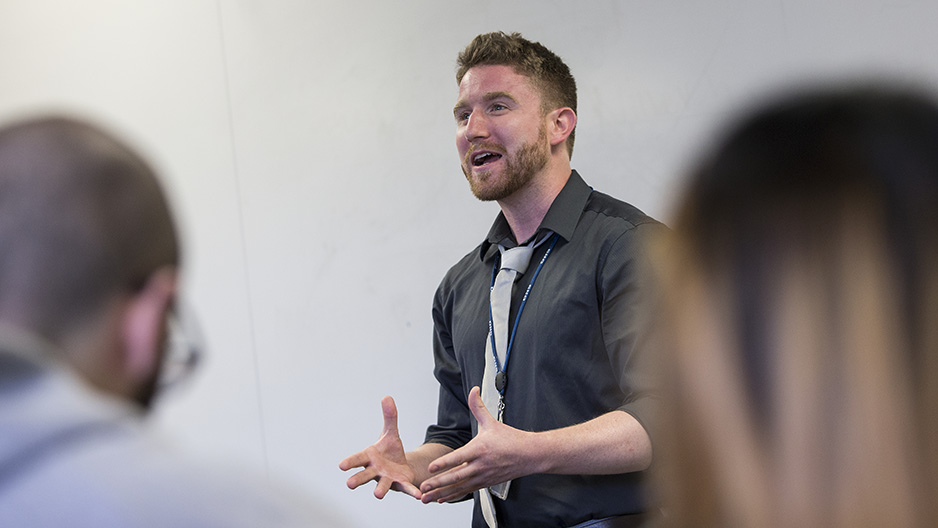Temple students are no stranger to discussing, dissecting and debating the vexing world issues of the day, including the troubling Syrian refugee crisis that has displaced millions. But on a recent Friday afternoon, a group packed into a Tuttleman Hall classroom for a rare opportunity to discuss that global dilemma with someone who has played a direct role in addressing it—and who’s also an Owl.
To begin the conversation, the presenter, Robert Berry, CLA ’08, offered a dose of personal context.
“It was an incredible country—it is an incredible country,” Berry said of Syria, reflecting on a visit there in 2008, three years before it fell into civil war. “I had wonderful experiences with the people there in peacetime.”
“These days, we hear so much in the news about Syria and we just think about the war and ISIS,” he added. “But it wasn’t like that before, when I was there.”
Years later, in 2016, he found himself back in the Middle East working as a refugee and asylum officer for the U.S. Department of Homeland Security (DHS). In his role, he was tasked with interviewing potential Syrian refugees in Jordan and Turkey to determine whether they qualified for resettlement in America.
“There are some unique challenges in terms of scale,” Berry, who currently works in a DHS office in New Jersey, said. The Syrian civil war has “created the second largest refugee crisis in history,” second only to World War II, he said.
That reality, illustrated in news coverage of boats sinking in the Mediterranean and in jarring images of children’s bodies washed up on shorelines, prompted former President Barack Obama to increase the number of refugees slated to come from Syria. And that action led officers like Berry to be deployed to the Middle East to help interview prospective refugees.
[node:pullquote]“I was lucky enough to be on the team that helped resettle” those refugees, he said, calling it “one of the largest resettlement efforts in history.”
Berry was based in Jordan from February to May 2016 and later stationed in Turkey.
Those months were largely spent interviewing displaced individuals, often for several hours per applicant, he said. Berry’s job was to weigh whether each individual was indeed a refugee in the legal sense—in other words, someone displaced from their home country and fleeing because of persecution or a “well-founded fear of persecution.” That could be persecution on the grounds of “race, religion, nationality, political opinion and membership in a particular social group,” he said.
The United States refugee program has become a divisive issue, with an ongoing debate focused on the veracity of the vetting process.
Berry—who made clear he was offering a matter-of-fact conversation during the presentation, which was part of Temple’s ongoing Dissent in America Teach-in series—told the students he could not discuss many aspects of the process.
“What I can say to you is that indeed this population of immigrants that’s coming to the United States is the most heavily vetted group of people trying to get to the United States,” he said. He noted it can take upward of three years for such refugees to be admitted to America.
It’s an exhausting process for all those involved, but Berry said it’s a rewarding one.
“I love my work. I love the ability to help people who qualify for that help under our laws,” Berry said in an interview before the discussion. “I enjoy meeting new people around the world and to talk with them and hear their stories.”
The Media, Pennsylvania, native didn’t know he’d pursue such a job when he first arrived at Temple in the early aughts. He completed a double major in Asian studies and religion while also minoring in political science and Japanese.
After graduating from Temple, Berry studied as a Fulbright student in Oman, where he analyzed democratic institutions written into Sharia Law. He then completed a master’s degree in law and diplomacy at Tufts University before working in the peace-building organization Search for Common Ground. He later worked as a program director at Envoys, which develops global education programming for schools.
That interesting career trajectory made for a subplot of sorts for the teach-in that Ruth Ost hoped would be heartening for students.
“One of the things students worry about is what they can do with their major,” said Ost, director of Temple’s Honors Program, who helped plan Berry’s visit. “Every major has merit. Their transcripts tell a really interesting story of who they are.”
Berry said his mission for the conversation was to ensure students understood the legal aspects of refugee and asylum processes, as well as the magnitude of the situation in Syria. It represented a return to the school he said helped prepare him for a unique career path.
“To have studied religion and politics and culture and language—these are things that, if you can understand them, the world opens up to you in a much deeper way,” Berry said. “The ability to understand people and things that influence them is very, very important. Temple provided me with that background.”
Mar. 7, 2017

Last week, alumnus Robert Berry of the U.S. Department of Homeland Security discussed the challenges in the Syrian refugee crisis during the College of Liberal Arts’ Dissent in America Teach-In event.
Photo by Joseph V. Labolito
